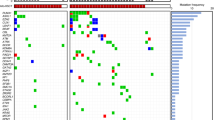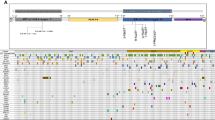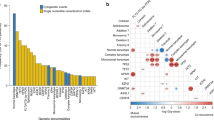Abstract
Although next-generation sequencing has allowed for the detection of somatic mutations in myelodysplastic syndromes (MDS), the clinical relevance of variant allele frequency (VAF) for the majority of mutations is unknown. We profiled TP53 and 20 additional genes in our training set of 219 patients with MDS or secondary acute myeloid leukemia with findings confirmed in a validation cohort. When parsed by VAF, TP53 VAF predicted for complex cytogenetics in both the training (P=0.001) and validation set (P<0.0001). MDS patients with a TP53 VAF > 40% had a median overall survival (OS) of 124 days versus an OS that was not reached in patients with VAF <20% (hazard ratio (HR), 3.52; P=0.01) with validation in an independent cohort (HR, 4.94, P=0.01). TP53 VAF further stratified distinct prognostic groups independent of clinical prognostic scoring systems (P=0.0005). In multivariate analysis, only a TP53 VAF >40% was an independent covariate (HR, 1.61; P<0.0001). In addition, SRSF2 VAF predicted for monocytosis (P=0.003), RUNX1 VAF with thrombocytopenia (P=0.01) and SF3B1 with ringed sideroblasts (P=0.001). Together, our study indicates that VAF should be incorporated in patient management and risk stratification in MDS.
This is a preview of subscription content, access via your institution
Access options
Subscribe to this journal
Receive 12 print issues and online access
$259.00 per year
only $21.58 per issue
Buy this article
- Purchase on Springer Link
- Instant access to full article PDF
Prices may be subject to local taxes which are calculated during checkout





Similar content being viewed by others
References
Papaemmanuil E, Gerstung M, Malcovati L, Tauro S, Gundem G, Van Loo P et al. Clinical and biological implications of driver mutations in myelodysplastic syndromes. Blood 2013; 122: 3616–3627.
Yoshida K, Sanada M, Shiraishi Y, Nowak D, Nagata Y, Yamamoto R et al. Frequent pathway mutations of splicing machinery in myelodysplasia. Nature 2011; 478: 64–69.
Papaemmanuil E, Cazzola M, Boultwood J, Malcovati L, Vyas P, Bowen D et al. Somatic SF3B1 mutation in myelodysplasia with ring sideroblasts. N Engl J Med 2011; 365: 1384–1395.
Malcovati L, Papaemmanuil E, Ambaglio I, Elena C, Galli A, Della Porta MG et al. Driver somatic mutations identify distinct disease entities within myeloid neoplasms with myelodysplasia. Blood 2014; 124: 1513–1521.
Jonveaux P, Fenaux P, Quiquandon I, Pignon JM, Lai JL, Loucheux-Lefebvre MH et al. Mutations in the p53 gene in myelodysplastic syndromes. Oncogene 1991; 6: 2243–2247.
Bejar R, Stevenson K, Abdel-Wahab O, Galili N, Nilsson B, Garcia-Manero G et al. Clinical effect of point mutations in myelodysplastic syndromes. N Engl Med 2011; 364: 2496–2506.
Kulasekararaj AG, Smith AE, Mian SA, Mohamedali AM, Krishnamurthy P, Lea NC et al. TP53 mutations in myelodysplastic syndrome are strongly correlated with aberrations of chromosome 5, and correlate with adverse prognosis. Br J Haematol 2013; 160: 660–672.
Bejar R, Stevenson KE, Caughey B, Lindsley RC, Mar BG, Stojanov P et al. Somatic mutations predict poor outcome in patients with myelodysplastic syndrome after hematopoietic stem-cell transplantation. J Clin Oncol 2014; 32: 2691–2698.
Bejar R, Lord A, Stevenson K, Bar-Natan M, Perez-Ladaga A, Zaneveld J et al. TET2 mutations predict response to hypomethylating agents in myelodysplastic syndrome patients. Blood 2014; 124: 2705–2712.
Bally C, Ades L, Renneville A, Sebert M, Eclache V, Preudhomme C et al. Prognostic value of TP53 gene mutations in myelodysplastic syndromes and acute myeloid leukemia treated with azacitidine. Leuk Res 2014; 38: 751–755.
Walter MJ, Shen D, Ding L, Shao J, Koboldt DC, Chen K et al. Clonal architecture of secondary acute myeloid leukemia. N Engl J Med 2012; 366: 1090–1098.
Passamonti F, Rumi E . Clinical relevance of JAK2 (V617F) mutant allele burden. Haematologica 2009; 94: 7–10.
Vardiman JW, Thiele J, Arber DA, Brunning RD, Borowitz MJ, Porwit A et al. The 2008 revision of the World Health Organization (WHO) classification of myeloid neoplasms and acute leukemia: rationale and important changes. Blood 2009; 114: 937–951.
Mohamedali AM, Gaken J, Ahmed M, Malik F, Smith AE, Best S et al. High concordance of genomic and cytogenetic aberrations between peripheral blood and bone marrow in myelodysplastic syndrome (MDS). Leukemia 2015; 29: 1928–1938.
Richards S, Aziz N, Bale S, Bick D, Das S, Gastier-Foster J et al. Standards and guidelines for the interpretation of sequence variants: a joint consensus recommendation of the American College of Medical Genetics and Genomics and the Association for Molecular Pathology. Genet Med 2015; 17: 405–424.
Jadersten M, Saft L, Smith A, Kulasekararaj A, Pomplun S, Gohring G et al. TP53 mutations in low-risk myelodysplastic syndromes with del(5q) predict disease progression. J Clin Oncol 2011; 29: 1971–1979.
Itzykson R, Kosmider O, Renneville A, Gelsi-Boyer V, Meggendorfer M, Morabito M et al. Prognostic score including gene mutations in chronic myelomonocytic leukemia. J Clin Oncol 2013; 31: 2428–2436.
Malcovati L, Papaemmanuil E, Bowen DT, Boultwood J, Della Porta MG, Pascutto C et al. Clinical significance of SF3B1 mutations in myelodysplastic syndromes and myelodysplastic/myeloproliferative neoplasms. Blood 2011; 118: 6239–6246.
Mian SA, Smith AE, Kulasekararaj AG, Kizilors A, Mohamedali AM, Lea NC et al. Spliceosome mutations exhibit specific associations with epigenetic modifiers and proto-oncogenes mutated in myelodysplastic syndrome. Haematologica 2013; 98: 1058–1066.
Cazzola M, Della Porta MG, Malcovati L . The genetic basis of myelodysplasia and its clinical relevance. Blood 2013; 122: 4021–4034.
Klco JM, Spencer DH, Miller CA, Griffith M, Lamprecht TL, O'Laughlin M et al. Functional heterogeneity of genetically defined subclones in acute myeloid leukemia. Cancer Cell 2014; 25: 379–392.
Chen CY, Lin LI, Tang JL, Ko BS, Tsay W, Chou WC et al. RUNX1 gene mutation in primary myelodysplastic syndrome—the mutation can be detected early at diagnosis or acquired during disease progression and is associated with poor outcome. Br J Haematol 2007; 139: 405–414.
Kita-Sasai Y, Horiike S, Misawa S, Kaneko H, Kobayashi M, Nakao M et al. International prognostic scoring system and TP53 mutations are independent prognostic indicators for patients with myelodysplastic syndrome. Br J Haematol 2001; 115: 309–312.
Horiike S, Kita-Sasai Y, Nakao M, Taniwaki M . Configuration of the TP53 gene as an independent prognostic parameter of myelodysplastic syndrome. Leuk Lymphoma 2003; 44: 915–922.
Bejar R, Papaemmanuil E, Haferlach T, Garcia-Manero G, Maciejewski JP, Sekeres MA et al. TP53 mutation status divides MDS patients with complex karyotypes into distinct prognostic risk groups: Analysis of combined datasets from the International Working Group for MDS-Molecular Prognosis Committee. 56th ASH Annual Meeting and Exposition 6-9 December 2014; vol. 124: San Francisco, CA, pp 532–532.
Kaneko H, Misawa S, Horiike S, Nakai H, Kashima K . TP53 mutations emerge at early phase of myelodysplastic syndrome and are associated with complex chromosomal abnormalities. Blood 1995; 85: 2189–2193.
Pellagatti A, Roy S, Genua CD, Burns A, McGraw K, Valletta S et al. Targeted re-sequencing analysis of 31 genes commonly mutated in myeloid disorders in serial samples from myelodysplastic syndrome patients showing disease progression. Leukemia 2016; 30: 248–250.
Genovese G, Kahler AK, Handsaker RE, Lindberg J, Rose SA, Bakhoum SF et al. Clonal hematopoiesis and blood-cancer risk inferred from blood DNA sequence. New Engl J Med 2014; 371: 2477–2487.
Jaiswal S, Fontanillas P, Flannick J, Manning A, Grauman PV, Mar BG et al. Age-related clonal hematopoiesis associated with adverse outcomes. N Engl J Med 2014; 371: 2488–2498.
Xie M, Lu C, Wang J, McLellan MD, Johnson KJ, Wendl MC et al. Age-related mutations associated with clonal hematopoietic expansion and malignancies. Nat Med 2014; 20: 1472–1478.
Author information
Authors and Affiliations
Corresponding author
Ethics declarations
Competing interests
CV, MM, SN and JH are employees of Genoptix, Inc., a Novartis company and own stock in the company. The other authors declare no conflict of interest.
Additional information
Author contributions
DS and EP designed the research, analyzed data and wrote the paper. MM, SN, KM, NA, AS and AK collected the data and gave final approval. RK, TC and SG analyzed data and gave the final approval. CV and JH collected the data, reviewed the paper and gave the final approval. JL, GM and AL reviewed the paper and gave the final approval.
Supplementary Information accompanies this paper on the Leukemia website
Rights and permissions
About this article
Cite this article
Sallman, D., Komrokji, R., Vaupel, C. et al. Impact of TP53 mutation variant allele frequency on phenotype and outcomes in myelodysplastic syndromes. Leukemia 30, 666–673 (2016). https://doi.org/10.1038/leu.2015.304
Received:
Revised:
Accepted:
Published:
Issue Date:
DOI: https://doi.org/10.1038/leu.2015.304
This article is cited by
-
The International Consensus Classification of myelodysplastic syndromes and related entities
Virchows Archiv (2023)
-
TP53 mutation variant allele frequency of ≥10% is associated with poor prognosis in therapy-related myeloid neoplasms
Blood Cancer Journal (2023)
-
Predictive values of mutational variant allele frequency in overall survival and leukemic progression of myelodysplastic syndromes
Journal of Cancer Research and Clinical Oncology (2022)
-
Myeloid leukemoid reaction after initial azacitidine therapy for chronic myelomonocytic leukemia
International Journal of Hematology (2022)
-
Correlation analysis of tumor purity with clinicopathological, molecular, and imaging features in high-grade gliomas
Neurosurgical Review (2022)



